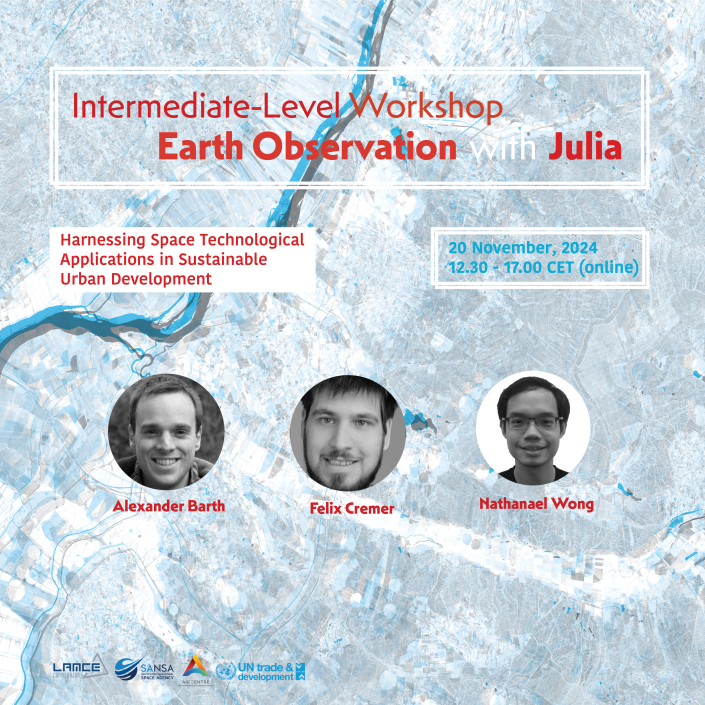Cursos e Aulas
The workshop will take place remotely on November 20, 2024. This event will be the first remote workshop organised by this team, following the previous workshops held in Rio de Janeiro, Brazil, from April 3 to 5, 2024, and in South Africa from August 6 to 8, 2024.
The event is designed as remote training, targeting professionals in remote sensing, geographic information systems, and data science, with a particular emphasis on encouraging women to participate. The primary goal of the workshop is to develop participants’ skills in using the Julia programming language to visualise and process Earth observation data, with a focus on applications related to sustainable human settlements.
OBJECTIVE
The proposed project would assist STI experts, with particular attention to female scientists, in the target countries to use geospatial technology to increase resilience to disaster and improve management of water quality, in the context of sustainable urban development. It will target 2 developing countries, Brazil and South Africa.
The ultimate objective is to build capacity in the beneficiary countries, including women scientists, that enables a wider use of satellite imagery to generate and share knowledge, data and information that meets critical disaster resilience needs and water quality needs, to enhance planning and implementing sustainable policies and attain progress needed for SDGs in particular SDG11 and SDG6. It also aims at contributing to SDG 5 on gender equality in particular in STI.
CONTEXT
Access and amount to Earth observation data has significantly improved in the last two decades, providing valuable data that can be used to address several global challenges including climate change, food security, poverty, and land degradation. United Nations Sustainable Development Goals, SDG 11, aim to make cities and human settlements inclusive, safe, resilient, and sustainable. The success of this goal and other national to settlement-level development goals requires access to spatial information to better plan and monitor development solutions to address societal and environmental challenges. There is therefore a need to train data scientists, producers, scientists, and users on the use of advanced tools to derive the required insights.
Julia is a high-level, high-performance programming language designed for numerical and scientific computing, as well as general-purpose programming. Julia was developed by MIT and was first introduced in 2012. It was created to address the need for a language that combines the ease of use and syntax of dynamic languages like Python with the speed and performance of compiled languages like C or Fortran.
SPONSORS AND PARTNERS
The event is organised by the Atlantic International Research Centre (AIR Centre) in collaboration with United Nations Conference on Trade and Development (UNCTAD), Laboratory of Computational Methods in Engineering (LAMCE) and the South African National Space Agency (SANSA). The event is funded by the Government of Portugal, with Brazil and South Africa as the beneficiary countries.
Detalhes do evento:
Dia(s): 20 nov 2024
Horário: 07h30 - 12h00
Local:
Online: Evento online - Registre-se!
Categorias
Inscrição:
A confirmação da inscrição é de responsabilidade do organizador do evento.
Valor: Free
Período de inscrição: until November, 20th
Site: https://www.aircentre.org/intermediate-level-workshop-earth-observation-with-julia/
Instituição responsável: LAMCE/COPPE/AirCentre/UNCTAD/ONU
Email do organizador: faho@lamce.coppe.ufrj.br
Telefone de contato: (21) 3938-0224

